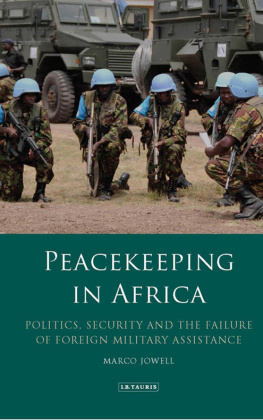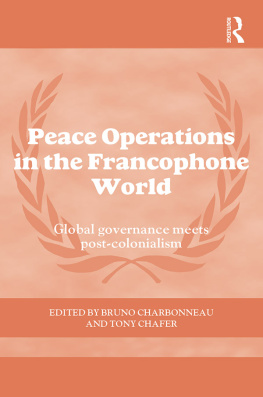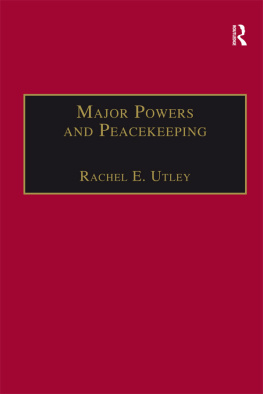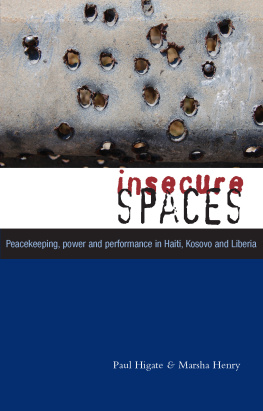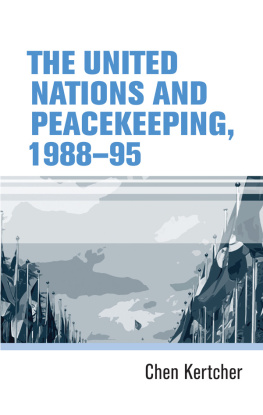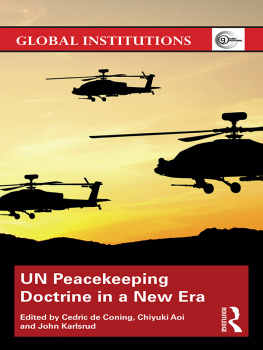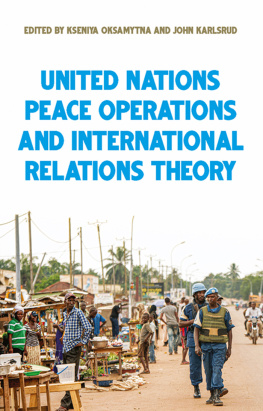Cover
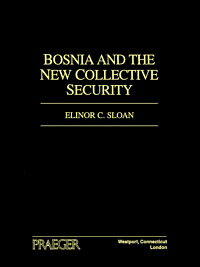
| title | : | Bosnia and the New Collective Security |
| author | : | Sloan, Elinor C. |
| publisher | : | Greenwood Publishing Group |
| isbn10 | asin | : | 0275961656 |
| print isbn13 | : | 9780275961657 |
| ebook isbn13 | : | 9780313046377 |
| language | : | English |
| subject | Yugoslav War, 1991-1995--Peace, Yugoslav War, 1991-1995--Bosnia and Hercegovina, Bosnia and Hercegovina--History--1992- , Crisis management. |
| publication date | : | 1998 |
| lcc | : | DR1313.7.P43S58 1998eb |
| ddc | : | 949.74203 |
| subject | : | Yugoslav War, 1991-1995--Peace, Yugoslav War, 1991-1995--Bosnia and Hercegovina, Bosnia and Hercegovina--History--1992- , Crisis management. |
Page i
BOSNIA AND THE NEW COLLECTIVE SECURITY
Page ii
This page intentionally left blank.
Page iii
BOSNIA AND THE NEW COLLECTIVE SECURITY
ELINOR C.SLOAN

Page iv
Library of Congress Cataloging-in-Publication Data
Sloan, Elinor C. (Elinor Camille), 1965
Bosnia and the new collective security/Elinor C.Sloan.
p. cm.
Includes bibliographical references and index.
ISBN 0-275-96165-6 (alk. paper)
1. Yugoslav War, 1991Peace. 2. Yugoslav War, 1991Bosnia
and Hercegovina. 3. Bosnia and HercegovinaHistory1992
4. Crisis management. I. Title.
DR1313.7.P43S58 1998
949.703DC21 984943
British Library Cataloguing in Publication Data is available.
Copyright 1998 by Elinor C.Sloan
All rights reserved. No portion of this book may be
reproduced, by any process or technique, without the
express written consent of the publisher.
Library of Congress Catalog Card Number: 984943
ISBN: 0-275-96165-6
First published in 1998
Praeger Publishers, 88 Post Road West, Westport, CT 06881
An imprint of Greenwood Publishing Group, Inc.
Printed in the United States of America

The paper used in this book complies with the
Permanent Paper Standard issued by the National
Information Standards Organization (Z39.481984).
10 9 8 7 6 5 4 3 2
Page v
To Thomas
Page vi
This page intentionally left blank.
Page vii
Contents
Preface | ix |
Introduction | xi |
Acronyms | xiii |
Chapter 1 | The Range of Choice: Crisis Management Tools for the Post-Cold War Era | |
Chapter 2 | Prelude to the Bosnian Crisis | |
Chapter 3 | Peacekeeping in Bosnia | |
Chapter 4 | Peacemaking in Bosnia | |
Chapter 5 | Peace Enforcement in Bosnia | |
Chapter 6 | Peacebuilding in Bosnia | |
Chapter 7 | Conclusion | |
Appendix 1: | UNPROFOR and IFOR Compared | |
Appendix 2: | Forms of Military Operations Compared | |
Selected Bibliography | |
Index | |
Page viii
This page intentionally left blank.
Page ix
Preface
In the fall of 1993, I began to research international crisis management in the former Yugoslavia. The more I read the crisis management literature, the more I realized that it was not fully relevant to the contemporary, nontraditional crises of the Yugoslav sort. It seemed that the nature of crisis and crisis management had grown much more complex and that, as a result, there were now many factors at play that did not appear in the existing literature. These factors included new players, such as nonstate actors and international organizations; new circumstances, such as war having already broken out at some level; and as time went on, new responses such as peace enforcement and peacebuilding, in addition to the more familiar diplomatic peacemaking and traditional peacekeeping of the Cold War.
I felt that understanding the role of these peace support operations in the management of nontraditional crises was important because crisis management in such contexts had been identified as a central goal by the international community. In its most recent Alliance Strategic Concept, for example, the North Atlantic Treaty Organization (NATO) takes on the management of crises in circumstances that may arise from serious economic, social, and political difficulties, including ethnic and territorial disputes. What follows is my attempt to sort out the lines between the various operations and, in doing so, to contribute to the body of knowledge that seeks to improve the international communitys ability to address the nontraditional crises that have come to characterize the post-Cold War era.
Page x
A number of people were instrumental to the completion of this book. I wish to thank Dr. Robert L.Pfaltzgraff, Jr. for providing me the opportunity to study in this area. I am also grateful to Dr. Bernd Goetze and Mrs. Jean Shannon for their continued friendship and guidance. Lastly, this work would not have been possible without the unwavering support of my husband Thomas. While these people were invaluable, the responsibility for any mistakes or inaccuracies is entirely mine.
Page xi
Introduction
The nature of international crisis and crisis management has grown more complex in the post-Cold War era. Whereas traditional international crises originated in an interstate conflict, centered on adversaries, and occurred between peace and war, todays nontraditional crises may emerge from an intrastate conflict, include players who are not adversaries, and take place after war has already broken out at some level. While crisis management previously focused on state actors, it must now encompass a multitude of players, including state actors, nonstate entities, and international organizations. The primary goal of crisis management used to be to avoid war without relinquishing interests. By contrast, today the objective may be to prevent the crisis, terminate hostilities, or negotiate a long-term settlement. Managing a nontraditional crisis is likely to involve diplomatic peacemaking as well as a range of peace support operations, including peacekeeping, peace enforcement, and peacebuilding.
Perhaps no crisis has been more synonymous with the complexity of the post-Cold War security environment than Bosnia. The civil war that ravaged this newly independent state throughout much of the early 1990s prompted a series of international actions that, to the outside observer, appeared variously to be haphazard, confused, insufficient, and/or counter-productive. The international community vacillated among negotiating peace, keeping peace, and enforcing peace. The inscrutable conflict seemingly defied an appropriate response.
Next page

